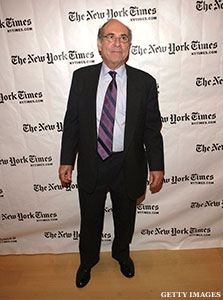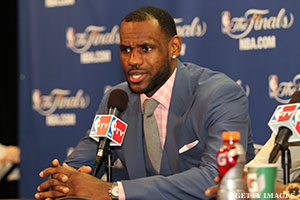
Welcome to the first installment of a new periodic feature, entitled "The PostGame Rap," in which Yahoo! golf editor Michael Arkush conducts an entire interview in a series of emails with an influential voice in the world of sports. In today's debut, Arkush corresponds with Robert Lipsyte, the longtime columnist for The New York Times, who recently released his memoir, "Accidental Sportswriter," which chronicles his passionate -- and often controversial -- opinions about the people and events he covered, including Muhammad Ali and Mickey Mantle.
ThePostGame: Please give your State of Sportswriting today report: Are fans better informed or worse informed these days?
Lipsyte: Sex, drugs, stats, salaries, fans have never gotten more information about athletes and games than they are getting right now and the range is amazing; from the wonkish - the Inside-the-Beltway speculation of Bleacher Report; to the snarkish - Deadspin, to the intensely political, Dave Zirin's often brilliant Edge of Sports. When I started out, sportswriters may have known much more about the real lives of the players than they do now (the access was almost total) but they never wrote about it. What really makes today so much better, however, is to be able to see the games, often with expert commentary, replayed from every angle and then dissected on SportsCenter. It's the future I'm worried about, as the leagues, teams and athletes try to control the news flow and set the narrative with Twitter, Facebook and blogs.
ThePostGame: Is there anything that can be done to curtail that trend toward their control?
Lipsyte: Push back, baby! Sportswriters and broadcasters just have to try harder, dig deeper, ask more questions and not be intimidated by threats -- like the loss of access. Who needs it if you aren't getting straight stuff anyway? And fans -- if they care enough -- have to refuse to take tweets from twits at face value. Of course, there's the Bill Simmons' take -- everything is about me, how I felt when the ball dropped in, and that may be the way of the future. The ballpark is in my navel.
ThePostGame: Will I ever be able to pick up a sports magazine and read a 5,000-word profile?
Lipsyte: Do we need to? We remember masterpieces by Frank Deford, Gary Smith and Bill Nack but forget so many bloated space-killers about this year's monster who loves to split QB's like wishbones while he loves his Moms to pieces. I want to read some hard news.

ThePostGame: Do we glorify the stars too much at the expense of more ordinary players, and does that tend to inflate their already-sizable egos?
Lipsyte: You bet. We "god them up" to call attention to ourselves, then kick them on the way down. Follow the negative curve on Lebron and Derek, two different examples of guys being phased out. Very different guys but the same old story.
ThePostGame: Looking back, is there anyone you felt you were too harsh with? Conversely, too soft?
Lipsyte: Same person - Ali. I blamed him as an accomplice in Malcolm's assassination for turning his back. I should have understood how emotionally in thrall he was then to the Nation of Islam. And while I reported on his screwing around I could have been tougher. He was, after all, selling family values.
ThePostGame: What is your take on LeBron James?
Lipsyte: LeBron is the modern gladiator we deserve. He ditched his neighborhood HS for a better deal and he ditched Cleveland. That's the celebrity sports biz, fair enough. And I blame ESPN not him for the bad taste of The Decision.
ThePostGame: I'll be Clarence from "It's a Wonderful Life" Would you be a sportswriter/author/TV personality again?
Lipsyte: No complaints. I've had a wonderful life. But if I were starting now, no accidents, I'd be a business reporter. I think that's where the real heroes and villains are. The real challenge in journalism now is to crack the secret deals that run politics, the economy and even sports. What does a pro FB team make, was it the Madoff Mets, what about college FB revenues,etc. That's where the action and danger lie for a news hawk.

ThePostGame: What did you learn about yourself by writing your memoir?
Lipsyte: The question I had hoped to answer when I started "An Accidental Sportswriter" was why I had let the accident go on so long. There were plenty of chances to leave sports. But I kept coming back. I think that even though I had not been a sports fan as a kid and tried hard not to be one in the press box - maybe because of those things - I found in sports a window on the world I never found anywhere else. If you don't get lost in the stats or the firefly starriness of the players, sports can lead you to every aspect of life. And it's still the most fun you can legally have with your body in public.
ThePostGame: You were pretty open about the dialogue between you and Costas. Has he called to discuss the book? Did you tell him what you were doing?
Lipsyte: I sent Costas a galley as a courtesy, a heads up, but by the time he responded the book had been printed. Since publication, Bob and I have met for drinks, texted and have had many long telephone conversations. Our positions have not changed. He says he admires me with reservations, specifically that I am unnecessarily contrarian and miss the celebratory aspects of sports. I think he is the best broadcaster of our time who has done some real journalism, but that is overshadowed by his fronting for major sports events, which makes him more of a hawker or salesman for the games than a reporter (he hates the word "shill" which appears in the book). Out of it all is emerging a curious friendship - we agree on so much - that it's beginning to look like the end of "Casablanca." Not sure yet who is Rick and who is Captain Renault.
ThePostGame: I'll call you Rick, and ask a final question: What's next?
Lipsyte: The other side of my career has been fiction for teenagers, particularly for boys and usually with a sports background. So I'm always at work on a new novel. But "An Accidental Sportswriter" has pulled me back into sports; I'm writing again, for everything from The Nation Magazine to bleacherreport.com, and taking speaking appearances to talk about Jock Culture, the way in which the values and definitions of the sports arena make impact on the way we do politics, business and war. And probably sex, too.




